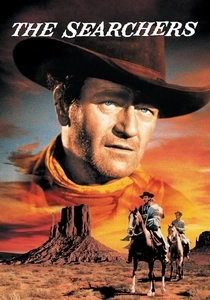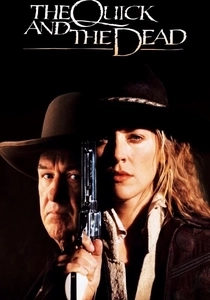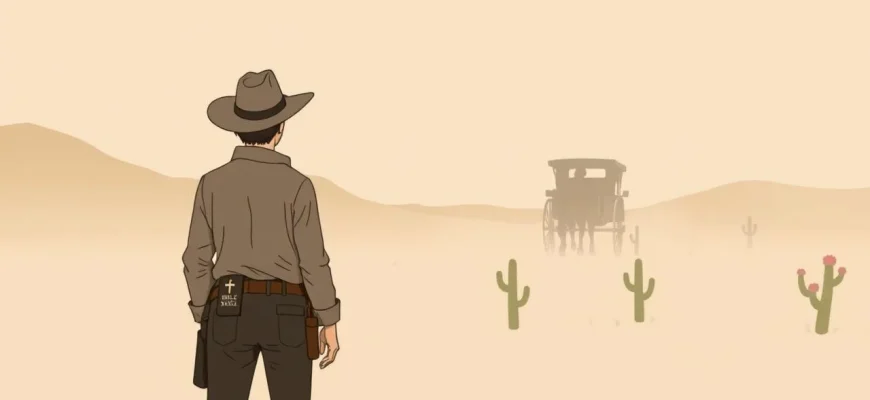The Wild West, with its vast landscapes and rugged individualism, often serves as a backdrop for tales of morality, redemption, and spiritual awakening. This curated selection of Western films delves into the complex relationship between faith and frontier life, offering viewers a unique blend of action, introspection, and divine intervention. From tales of redemption to the exploration of religious communities, these films provide a rich tapestry of stories where the gun and the Bible often share the same holster.

The Searchers (1956)
Description: This epic Western follows a Civil War veteran on his quest to rescue his niece from Comanche kidnappers, exploring themes of racial prejudice, vengeance, and redemption.
Fact: John Wayne's character, Ethan Edwards, is often cited as one of the most complex and morally ambiguous in Western cinema.
 Watch Now
Watch Now 
The Alamo (1960)
Description: This historical epic recounts the famous battle at the Alamo, focusing on themes of sacrifice, duty, and the spiritual resolve of the defenders.
Fact: John Wayne not only starred but also directed and co-produced this film, which was his passion project.
 Watch Now
Watch Now 
The Man Who Shot Liberty Valance (1962)
Description: A lawyer arrives in a small Western town to bring law and order, but his path crosses with a notorious outlaw, leading to a confrontation that tests his moral convictions.
Fact: This film is famous for its line, "When the legend becomes fact, print the legend," which encapsulates the theme of myth versus reality.
 Watch Now
Watch Now 
High Plains Drifter (1973)
Description: A stranger rides into a town with a dark past, taking on the role of sheriff and enforcer, with hints of supernatural elements and themes of divine punishment.
Fact: The film's ending, where the town is painted red, symbolizes the blood on the town's hands, a visual metaphor for their guilt.
 Watch Now
Watch Now 
The Outlaw Josey Wales (1976)
Description: After his family is killed, a Confederate soldier becomes an outlaw, finding redemption through acts of kindness and a newfound community, reflecting themes of forgiveness and spiritual growth.
Fact: The film was based on the novel "The Rebel Outlaw: Josey Wales" by Forrest Carter, who had a controversial background.
 Watch Now
Watch Now 
Heaven's Gate (1980)
Description: This epic Western, despite its troubled production, delves into themes of class conflict, corruption, and the quest for justice, with a spiritual dimension to the struggle.
Fact: The film's disastrous reception and budget overruns led to the downfall of United Artists, but it has since been re-evaluated and gained a cult following.
 Watch Now
Watch Now 
Pale Rider (1985)
Description: A mysterious preacher rides into a small mining town to help the residents fight against a ruthless mining company, embodying themes of divine retribution and justice.
Fact: Clint Eastwood not only starred in but also directed this film, which is often seen as a modern take on the classic Western "Shane."
 Watch Now
Watch Now 
The Quick and the Dead (1995)
Description: A mysterious female gunslinger arrives in a town to participate in a deadly quick-draw contest, seeking revenge and redemption, with undertones of divine justice.
Fact: Sharon Stone's character, Ellen, was originally written for a male actor, but Sam Raimi decided to cast Stone to add a unique twist to the story.
 Watch Now
Watch Now 
The Proposition (2005)
Description: Set in the Australian outback, this film explores themes of justice, family, and the moral ambiguity of revenge, with a strong undercurrent of religious symbolism.
Fact: The film's script was written by Nick Cave, who also contributed to the soundtrack, adding a unique, dark tone to the narrative.
 Watch Now
Watch Now 
The Salvation (2014)
Description: A Danish settler in the American West seeks revenge for his family's murder, encountering a corrupt town and a preacher with a dark secret, exploring themes of vengeance and redemption.
Fact: The film was shot in South Africa, standing in for the American West, to capture the desolate beauty of the landscape.
 Watch Now
Watch Now 








